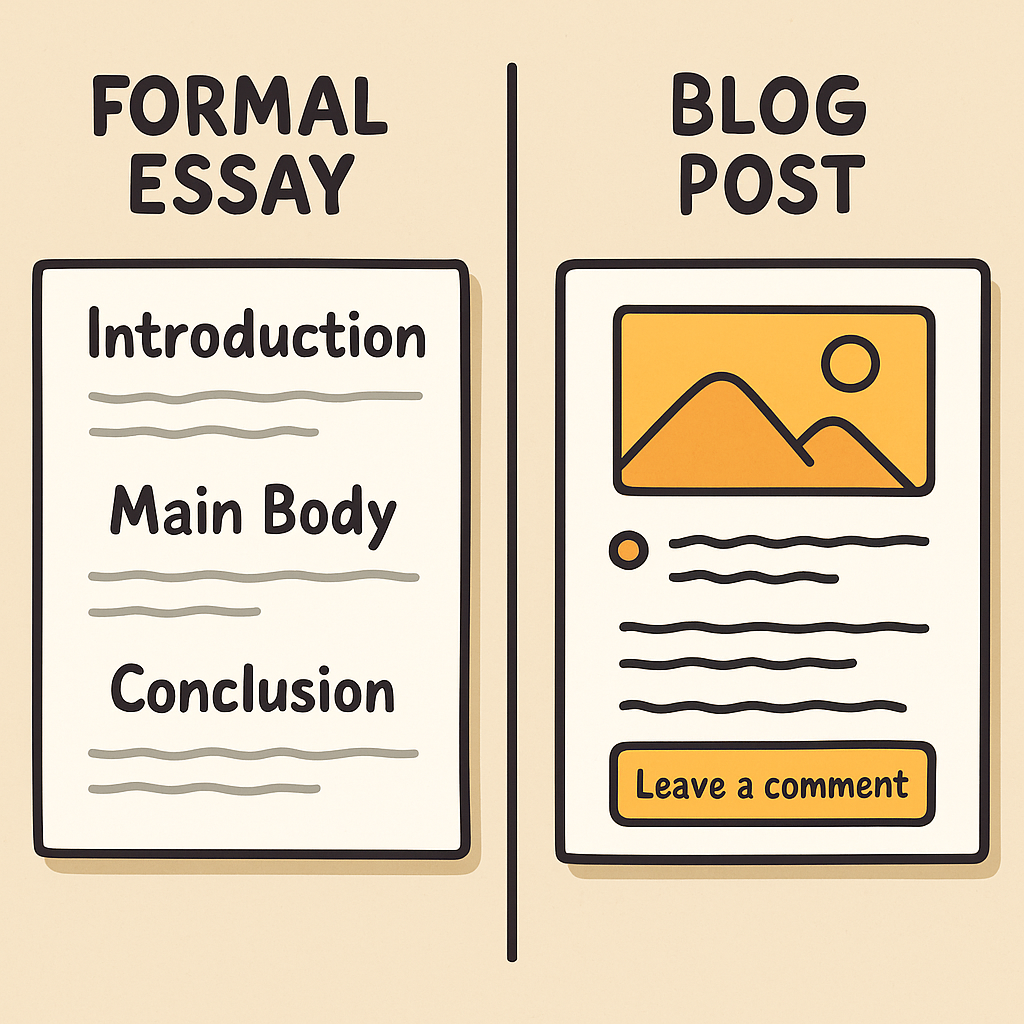Blogging and essay writing might sound like distant cousins — but really, blogging isn’t the same as writing essays, and if you’ve ever felt stuck thinking your blog post needs to read like a school assignment, let’s get rid of that mindset now.
Why Blogging Isn’t the Same as Writing Essays
The phrase “Blogging isn’t the same as writing essays” sums it up perfectly. Essays are formal, often rigid in tone, and designed for academic eyes. Blogging? It’s personal, flexible, and written for real people with real questions — not professors with red pens.
Essays expect you to prove a point, cite a dozen sources, and stick to a tight structure. Blogging invites you to tell a story, be relatable, and most of all — connect. When your audience reads your post, they’re usually skimming with coffee in hand, not preparing for a debate.

Structure with Flow: Blogs Have Freedom
Blogging isn’t the same as writing essays when it comes to structure, too. A traditional essay follows a strict format: introduction, argument, conclusion.
Blog posts, on the other hand, breathe a little easier. You might start with a personal story, drop in a list of tips, and wrap with a simple call to action.
Instead of paragraphs packed with heavy language, blog posts often use:
- Short sentences
- Bullet points
- Subheadings
- Real talk
This makes your content easier to scan and far more enjoyable for your audience — especially beginners just starting their online journey.
Tone and Personality Matter More Than Formality
One of the biggest differences? Voice. Blogging isn’t the same as writing essays because you get to be yourself. You can be calm, cheeky, warm, curious, or even a bit goofy. No footnotes required.
While an essay might say:
“One could argue the significance of this phenomenon…”
A blog post would simply say:
“Here’s why this really matters — and how it might help you.”
Let your personality show. That’s what makes blogs engaging — and makes people come back for more.

The Reader Comes First: Creating Relatable Content
Blogging isn’t the same as writing essays because blogs put the reader at the centre. It’s not about proving what you know — it’s about helping someone else learn, laugh, or feel less alone.
That’s why clarity matters more than complexity. Forget long intros and confusing words. Your goal is to:
- Solve a problem
- Answer a question
- Offer encouragement
This mindset shift makes writing easier and more effective.
Trust & Growth: Blogging With E-E-A-T in Mind
If you want your blog to grow and rank well on Google, it’s worth understanding a little thing called E-E-A-T: Experience, Expertise, Authoritativeness, and Trustworthiness.
This isn’t scary — it just means showing you know your stuff, writing from real experience, and being honest with your readers. You don’t need a degree — you need to be helpful.
Wealthy Affiliate, for example, helped me understand how to build trust in my content, structure my posts, and build an online presence. It’s worth exploring if you want a structured path to growing your blog
Blogging in 2025: Creativity Wins
Finally, let’s talk future. Blogging isn’t the same as writing essays, and it never will be — because it keeps evolving.
- Micro-blogging on social media
- AI tools to help brainstorm and polish
- Short-form videos or embedded tutorials
- Interactive content like quizzes or polls
You don’t need to chase every trend, but knowing what’s possible opens up options. And the blog itself? Still the best place to share your voice in full.
And Finally…
Has this post changed how you see blogging?
I’d love to hear what feels different or clearer now that we’ve untangled it from essay writing.
Leave a comment below and share your biggest writing worry — or the thing you’re most excited to blog about.
Here’s a little transparency: My website contains affiliate links. This means if you click and make a purchase, I may receive a small commission. Don’t worry, there’s no extra cost to you. It’s a simple way you can support my mission to bring you quality content.

